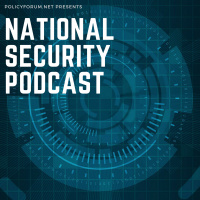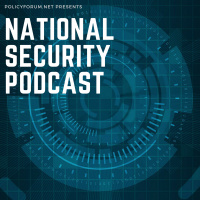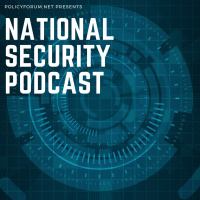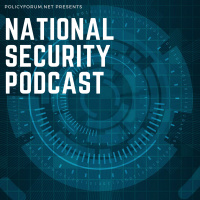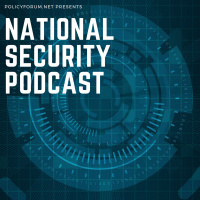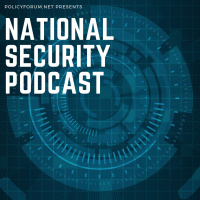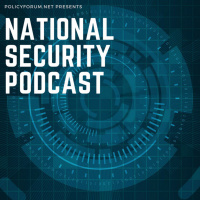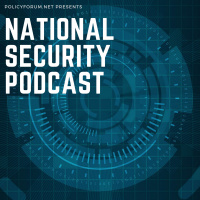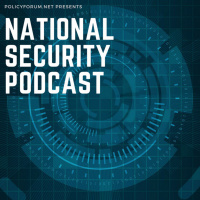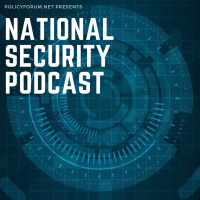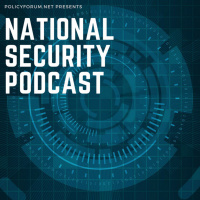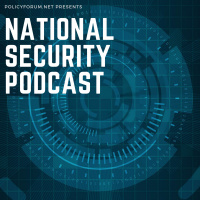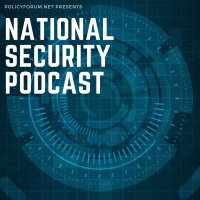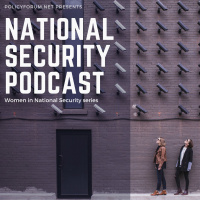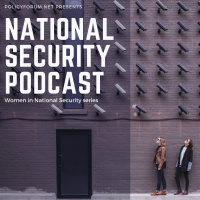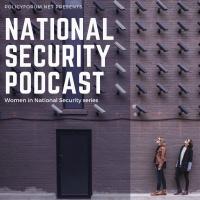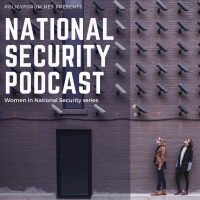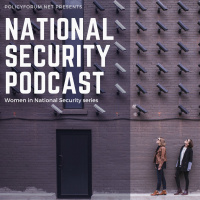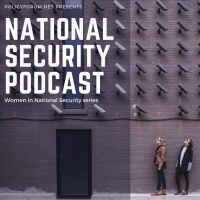Sinopsis
Chris Farnham and Katherine Mansted bring you expert analysis, insights and opinion on Australia and the region's national security challenges in this pod from Policy Forum. Produced with the support of the ANU National Security College.
Episodios
-
National Security Podcast extra: Hugh White on How to Defend Australia
04/07/2019 Duración: 01h12minIn this National Security Podcast extra, we speak to Professor Hugh White AO about his new book, How to Defend Australia. Hugh argues for a radical shift in the way we view America’s role in Asia, and that Australia can no longer count on US support should it find itself under the threat of being attacked. The discussion includes how China’s expanding economic and military power is dominating the region and what that means for the structure of Australia’s defence forces. As the region shifts and China flexes its military and economic muscles, how should Australia structure its national defence for the coming decades? Throughout his book, Hugh suggests that Australia should abandon its current plans for 12 French submarines and building 24 submarines, sell most of its newer vessels, and double the purchase of Joint Strike Fighter aircrafts. Little has set a fire under Australia’s national security community this much since his last book, The China Choice. Join us for an in-depth conversation where we test some
-
National security and the media in Southeast Asia
03/07/2019 Duración: 49minAs geopolitical competition intensifies again in the region, Southeast Asia finds itself increasingly pressured by China and the US. Whilst China aggressively pursues its claim over Southeast maritime territory, it also commits to large investment programs throughout the region. And as the US defence establishment works to convince East Asia that American commitment to the region is not waning, President Trump continues to sow uncertainty with diplomacy by Twitter. How is Southeast Asia reacting to these new regional flows, what is important to the people of the region, and how well are they being represented by their political leaders? How does the political communicate with the social? What role is the new media landscape playing in this new relationship? In this podcast, Chris Farnham speaks to three journalists from leading Southeast Asian media outlets discussing East Asian geopolitics, the influence of great powers in the ASEAN region, and how the media landscape is reacting to the Internet and social m
-
Battlefield singularity, AI pixie dust, and the future of war
20/06/2019 Duración: 40minIs artificial intelligence (AI) the game-changer many think it will be? Will advances in AI change the nature of competition and conflict between states, or lift the fog of war? Do the American and Chinese militaries even have what it takes to fully operationalise AI, and what are the weaknesses and risks of each country’s approach? In this episode of the National Security Podcast, Katherine Mansted learns about the People's Liberation Army's (PLA) military modernisation and China’s drive to lead the world in AI, as well as the blind spots and limitations of the PLA’s focus on innovation. She also seeks to understand the key enablers of AI — from data and cloud computing to 5G — as well as the bureaucratic and doctrinal impediments to effective AI applications, and how countries can manage the safety and escalation risks of the AI 'race'. Elsa B Kania is an adjunct senior fellow with the Technology and National Security Program at the Center for a New American Security, a non-resident fellow with the Australi
-
Economic warfare and the globalisation of innovation
13/06/2019 Duración: 46minTechnology and innovation are key drivers of social progress and economic prosperity. At the same time, emerging technologies can be 'double-edged swords' used to undermine security and democracy. Innovation is also no longer something driven by genius individuals or major government projects. It is a highly comercialised, globalised endeavour. This means that the private sector is often caught in the middle of nation-state power plays. It also finds itself increasingly on the front-lines of national security challenges – as a player, deliberate target, or collateral damage. In this episode of the National Security Podcast, Katherine Mansted finds out why states are increasingly engaging in acts of 'economic warfare' against each other, and how this affects private sector interests. She seeks to understand how national security policymakers can work more closely with the private sector, and how democratic governments can preserve the advantages that come with an open and global innovation sector, while manag
-
The Quad pod
30/05/2019 Duración: 44minAfter a rocky start, the Quadrilateral Security Dialogue is seeing somewhat of a renaissance. What is driving the renewed interest from the US, Japan, Australia, and India? What are these countries looking to achieve out of the dialogue? Is the Quad going to emerge as a method of containing China, or is this minilateral more mythical than meaningful? Listen here: In this episode of the National Security Podcast, four experts representing the thinking from each of the Quad nations put forward their positions on what the Quad is, what it is not, what each nation sees in the grouping, and where the divergences of interests may arise. Zack Cooper is a Research Fellow at the American Enterprise Institute, where he studies US defence strategy in Asia. Dr Cooper is also an Adjunct Assistant Professor at Georgetown University and an associate with Armitage International. He previously served on staff at the Pentagon and White House, as well as the Center for Strategic and International Studies and the Center for Stra
-
Tech, law, and the day cyber turned kinetic
16/05/2019 Duración: 41minHow are social media platforms changing who has power inside democracies and in international relations? Should Israel's recent strikes on Hamas change our thinking on cyber and the use of force? With Australia in the midst of an election and another coming up in the US next year, can ‘critical thinking’ really protect us from electoral interference and fake news? In this episode, Katherine Mansted asks three cyber experts from Indiana University's Kelley School of Business Scott Shackelford, Angie Raymond, and Abbey Stemler, on the role of international law in transnational data sharing. They also discuss whether data will be Balkanised as many suspect the Internet will be, and whether users could possibly limit the data that’s collected on them daily in the future. Angie Raymond is Associate Professor of Business Law and Ethics at Indiana University, as well as being Adjunct Associate Professor of Law. She has written widely in international commercial law, international commercial arbitration, and interna
-
National Security Podcast: Laura Rosenberger – Democracy, China, and Trump
10/04/2019 Duración: 36minWhy are relations between Washington and Beijing increasingly competitive, and should we expect a reset any time soon? Will Washington have an enduring role to play in the Indo-Pacific? Is technological advancement making strategy more difficult in the 21st century? How can democracies respond to the rising risk of technology-enabled foreign interference? In this National Security Podcast, Katherine Mansted talks with Laura Rosenberger about the security challenges democracies face in a world of renewed great power competition and rapid technological change. They also examine the pros and cons of the Trump administration’s approach to the China challenge, and take a look at what good foreign policy could look like in the 21st century, as well as how everyone – from citizens to national governments and overseas allies and partners – can play a role in securing democracies. Laura Rosenberger is a 2019 Vice-Chancellor’s Distinguished Visitor with the ANU National Security College, and a director of the Alliance
-
Strategic forecasting with the UK Ministry of Defence
27/03/2019 Duración: 35minOn this National Security Podcast, Brigadier Ewen Murchison from the UK Ministry of Defence joins Chris Farnham to talk about futures forecasting in national and international security. What is futures forecasting and how is it different to ‘crystal ball gazing’? Can we reliably predict the future of warfare and international security, or does strategic forecasting aim to achieve something entirely different? In this episode of the National Security Podcast, Chris Farnham finds out about forecasting strategic futures with Brigadier Ewen Murchison from the Development, Concepts and Doctrine Centre of the UK Ministry of Defence. They also discuss how offensive strategic weapons are changing, and answer whether arts and culture can help military planners and policymakers better plan for what’s ahead. Ewen Murchison is the Head of Futures and Strategic Analysis at the UK Ministry of Defence’s Development, Concept and Doctrine Centre (DCDC) – an internal think tank that has been responsible for publishing the Glob
-
National Security Podcast extra: India and Pakistan, to the brink again
06/03/2019 Duración: 56minHow has history continuously pitted two nuclear-armed nations against each other over land-locked territory? In a deadly mix of terrorism, giant conventional forces, and nuclear weapons, India and Pakistan are again trading blows over the Line of Control in Jammu and Kashmir. In this National Security Podcast extra, Chris Farnham hears from Dr Claude Rakisits and Dr Michael Cohen about the latest spike in violence as well as its triggers and historical context. The experts also look at the roles of other countries, control over violent extremists, and how the mutual possession of nuclear weapons affects the situation. Claude Rakisits is Honorary Associate Professor at the Asia-Pacific College of Diplomacy at the Australian National University, and an Associate at Georgetown University. Dr Rakisits is an expert in defence and strategic issues, international affairs, and intelligence, and is specifically interested in Pakistan, Afghanistan, the Middle East, and Africa. Michael Cohen is a Senior Lecturer at the
-
Data, cyber, and the social contract
27/02/2019 Duración: 34minOn this episode of the National Security Podcast, co-host Katherine Mansted talks data, cyber, democracy, and the social contract with Dr Lesley Seebeck, CEO of the Australian National University's (ANU) Cyber Institute. Is the growing collection and aggregation of data likely to empower the individual and strengthen democracy? Or is it more likely to benefit manipulative corporations and encourage authoritarian governance? How should society frame the problem of privacy and information control, and where does regulation give way to personal responsibility? Lesley Seebeck is CEO of the Cyber Institute, Australian National University (ANU), on 30 July 2018. Lesley has extensive experience in strategy, policy, management, budget, information technology and research roles in the Australian Public Service, industry and academia. Katherine Mansted joined the National Security College as a Senior Researcher in 2018. Katherine’s professional background includes work in both law and government. She has been a commerc
-
Counter-terrorism and China's war on Uyghurs
13/02/2019 Duración: 48minIn this episode of National Security Podcast, Professor Michael Clarke talks with Chris Farnham about terrorism in China and his latest edited book Terrorism and Counter Terrorism in China: Domestic and foreign policy dimensions. Is the security landscape in China’s western region dominated by jihadism, Uyghur independence movements, or state terrorism? What is the 'minority question' the Chinese Communist Party asks, and is there an actual organised terror movement in China’s west or is the violence a response to government repression? Michael Clarke is an expert on the history and politics of the Xinjiang Uyghur Autonomous Region, People’s Republic of China, Chinese foreign policy in Central Asia, Central Asian geopolitics, and nuclear proliferation and non-proliferation. Chris Farnham is the presenter of the National Security Podcast. He joined the National Security College in June 2015 and is currently Senior Outreach and Policy Officer. His career focus has been on geopolitics with experience working in
-
Hostage diplomacy and the Huawei indictments
01/02/2019 Duración: 31minWith the arrests of Australian and Canadian citizens in China, Rory Medcalf discusses the implications of arbitrary arrests not only for intergovernmental relations but also for greater society. Katherine Mansted – our new co-host of the National Security Podcast – then shares with us her insights into the unsealing of the indictments against Huawei, as well as what this actually means for the US and its partners. Professor Rory Medcalf is the head of the National Security College at The Australian National University. His professional background involves more than two decades of experience across diplomacy, intelligence analysis, think tanks and journalism. Katherine Mansted joined the National Security College as a Senior Researcher in 2018. Katherine’s professional background includes work in both law and government. She has been a commercial solicitor with King & Wood Mallesons, a ministerial adviser to the federal government, and served as an Associate in the High Court of Australia. Chris Farnham is
-
An inside look at countering terror
04/12/2018 Duración: 45minNick Rasmussen is the former Director of the US National Counterterrorism Centre. In a wide-ranging discussion with host Chris Farnham, he brings his experience and expertise to bear on ISIS and Al Qaeda, growing concerns around home-grown terrorism, and the new technological challenges facing the US counter-terrorism industry. Topics discussed also include the impact of America’s gun laws on counter-terrorism efforts, the country’s lack of constructive political dialogue, and the relationship between the Trump administration and the intelligence community. Nicholas Rasmussen is a national security expert with over 27 years in US government service. He is Vice-Chancellor’s Distinguished Visiting Fellow at the Australian National University, former Director of the US National Counterterrorism Center (NCTC), and current Senior Director of the McCain Institute’s Counterterrorism Program. Chris Farnham is the presenter of the National Security Podcast. He joined the National Security College in June 2015 as Polic
-
National Security Podcast: Unpacking the APEC powerplays
20/11/2018 Duración: 14minDid the APEC forum just cease to be an economic summit? On this episode of the National Security Podcast, Chris Farnham chats with Professor Rory Medcalf about the quality of Chinese diplomacy, America’s decision to join Australia and PNG in building a naval base on Manus Island, and whether the world is currently in a pre-war era. Professor Rory Medcalf is the head of the National Security College at The Australian National University. His professional background involves more than two decades of experience across diplomacy, intelligence analysis, think tanks and journalism. Chris Farnham is the presenter of the National Security Podcast. He joined the National Security College in June 2015 as Policy and Events Officer. His career focus has been on geopolitics with experience working in and out of China for a number of years as well as operating in Australia and Southeast Asia. We’d love to hear your feedback for this podcast series! Send in your questions, comments, or suggestions for future episodes to pod
-
Women in National Security – episode 6
29/10/2018 Duración: 01h05minHosted by the ANU National Security College, the Women in National Security Conference is a forum on the participation of women in Australia’s future national security policy and practice – and the National Security Podcast is here to bring you the highlights. Accessible only by a seasonal four-wheel drive track in Far North Queensland, Wujal Wujal is one of the smallest Aboriginal Shire Councils in Australia. The 51st Battalion of the Far North Queensland Regiment is a long-range reconnaissance unit based in Cairns, who have been responsible for leading the Army’s surveillance forces for maritime border security. With Wujal Wujal underfunded and struggling to provide services to its population of 682 people, and with the 51st Battalion in need of a local workforce to fulfil its border security objectives, the two groups formed an unexpected but willing partnership. On this final podcast of the series hosted by Gabrielle Kneipp, Jacinta Carroll and Jay Caldwell hear from Eileen Deemal-Hall – the CEO of the Wu
-
Women in National Security – episode 5
27/10/2018 Duración: 38minHosted by the ANU National Security College, the Women in National Security Conference is a forum on the participation of women in Australia’s future national security policy and practice – and the National Security Podcast is here to bring you the highlights. On this fifth episode of the series, Chris Farnham hears from Nicole Renvert about Germany’s ties to the Indo-Pacific, catches up with participants on the final day of the conference, and chats to Huong Le Thu about how Southeast Asia views the Quadrilateral Security Dialogue. This episode is hosted by Gabrielle Kneipp. Wait! You thought this was the end, but we’re not quite done. One of the real highlights of the conference was 'Security through community: Wujal Wujal security songlines'. The panel featured Eileen Deemal-Hall and Tim Rutherford, and showcased an Indigenous community initiative to build human security by partnering with the local Army unit in Far North Queensland. We were so blown away by it that we got them into the studio to tell Jaci
-
Women in National Security – episode 4
26/10/2018 Duración: 47minHosted by the ANU National Security College, the Women in National Security Conference is a forum on the participation of women in Australia’s future national security policy and practice – and the National Security Podcast is here to bring you the highlights. On this fourth episode of the series, Chris Farnham hears from Assistant Minister for Home Affairs Linda Reynolds about her career in the national security community, chats to Lydia Khalil about the fall of ISIS and the future of the Caliphate, and catches up with some participants of the conference including Professor Rory Medcalf and ANU Vice-Chancellor Professor Brian Schmidt. Then, as the feature interview for this podcast, Katherine Mansted from the National Security College chats to Chantal de Jonge Oudraat, President of Women in International Security (WIIS). Topics discussed include the changing nature of global conflict; the impact of women on peace negotiations; and why the world is making slow progress on the Women, Peace and Security agenda.
-
Women in National Security – episode 3
25/10/2018 Duración: 29minHosted by the ANU National Security College, the Women in National Security Conference is a forum on the participation of women in Australia’s future national security policy and practice – and the National Security Podcast is here to bring you the highlights. This jam-packed third episode is hosted by Gabrielle Kneipp and was recorded on the first day of the conference. First up, Chris Farnham hears from Matilda House, who opened the event with a Welcome to Country, before catching up with some of the conference attendees for some on-the-ground insights. Last but not least, the National Security College’s Jennifer Hunt chats with Madelyn Creedon about her long career in nuclear politics and the recent US decision to pull out of the Intermediate-Range Nuclear Forces Treaty. Listen here: Matilda House is Chair of the Ngambri Local Aboriginal Land Council. She was instrumental in establishing the ANU Tjabal Indigenous Higher Education Centre in association with the Indigenous students on campus in 1989. Madelyn
-
Women in National Security – episode 2
23/10/2018 Duración: 40minHosted by the ANU National Security College, the Women in National Security Conference is a forum on the participation of women in Australia’s future national security policy and practice. From data to deterrence, new technologies to counter-terrorism, Indo-Pacific strategy to the future of power, this sold-out conference features a range of expert speakers to challenge yesterday’s assumptions – and the National Security Podcast is here to bring you the highlights. This second episode is hosted by Gabrielle Kneipp and comes in two parts. First, Chris Farnham hears from conference convenor Jacinta Carroll about diversity in Australia’s national security community. Next, Jacinta Carroll talks to Nava Nuraniyah about the gender and social aspects of extremism in Southeast Asia. Jacinta Carroll is the Director of National Security Policy at the ANU National Security College, and convenor of the Women in National Security Conference. Previously, Jacinta was the inaugural Head of the Counter-Terrorism Policy Centre
-
Women in National Security – episode 1
23/10/2018 Duración: 33minHosted by the ANU National Security College, the Women in National Security Conference is a forum on the participation of women in Australia’s future national security policy and practice. From data to deterrence, new technologies to counter-terrorism, Indo-Pacific strategy to the future of power, this sold-out conference will feature a range of expert speakers to challenge yesterday’s assumptions – and the National Security Podcast will be there to bring you the highlights. In this first episode, host Chris Farnham hears from Amy Roberts and Catherine Bridges about how Australia can secure its next generation of cyber experts. Amy Roberts is an Assistant Director with the Australian Signals Directorate. She manages the Government’s Cyber Security Challenge Australia, the largest national tertiary ‘hacking’ competition, in partnership with the corporate sector and academia, to identify the next generation of cyber talent. Catherine Bridges is Cyber Advisor at the ANU National Security College, on secondment f

